Remembering Immigrant Workers’ Contributions to Rebuilding After Hurricane Katrina
BY SUE WEISHAR | September 4, 2020
Fifteen years ago, on August 29, 2005, after federal levees failed to protect the city of New Orleans from Hurricane Katrina’s 20-foot storm surge, over 1,500 New Orleaneans lost their lives, 214,7000 homes in the City of New Orleans were damaged or destroyed, and a community was forever changed.
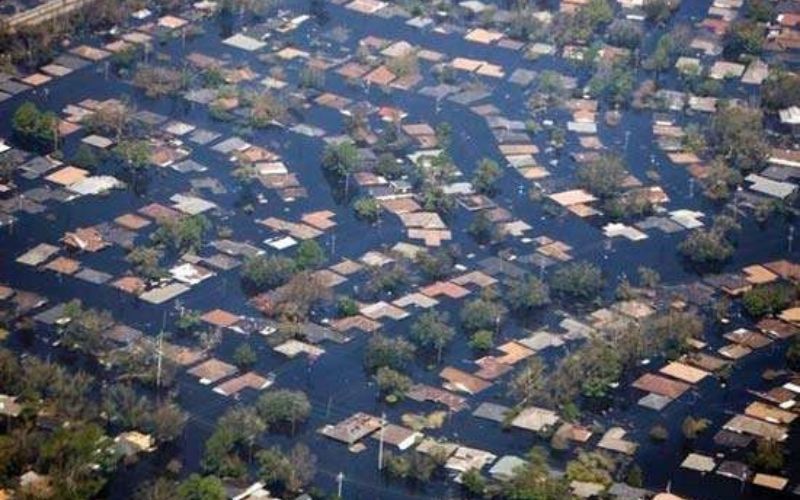
Aerial view of flooding in the New Orleans area following Hurricane Katrina, August 2005. [Image: Paul Morse/The White House]
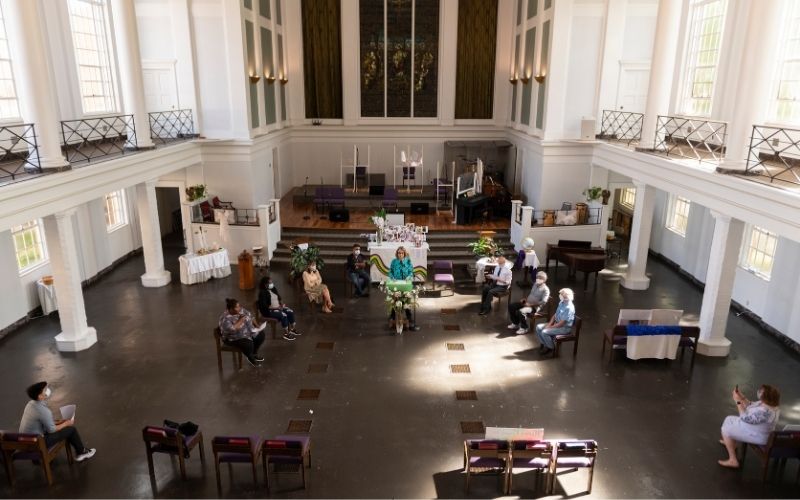
Prayer Service for Katrina Immigrant Workers, Looking Back and Moving Forward Together in Faith and Solidarity on August 28, 2020.
A population-based survey conducted at the height of the rebuilding effort in March 2006 found that nearly half the reconstruction work force was Latinx, of which 54 percent were undocumented immigrants. Cristi Rosales-Fajardo, executive director of El Pueblo NOLA, is married to an undocumented immigrant from Honduras and was a speaker at the prayer service. Cristi noted that although her husband helped to rebuild hundreds of homes since Katrina, she and her family live in fear of immigration authorities. She also shared how upset she was when she saw a promotional image about Rebuilding New Orleans on the internet that morning which featured white college students. She said that she felt that the labor of undocumented immigrants was not being appreciated and that her community felt “dispensable.” “It took all of us, Black, Brown, white to rebuild the city… We are not being asked to be put on a pedestal, we are only asking to be treated as human beings.”
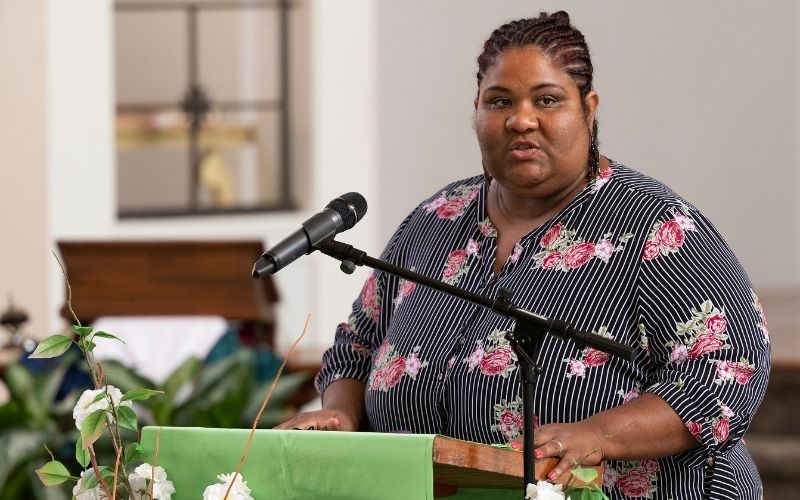
Cristi Rosales-Fajardo, executive director of El Pueblo NOLA, speaks at the prayer service.
To provide a vivid example of how important immigrant workers were to rebuilding our community, Pastor Shawn Anglim, whose church, First Grace United Methodist Church, hosted the prayer service, surprised everyone in attendance by removing the grate in the church floor to an air vent that ran the length of the sanctuary and stepped into it. He said that when he first saw the gutted and clean sanctuary after moving to New Orleans ten months after Katrina, the contractor for his church’s rebuilding work told him that immigrant workers had crawled into the ventilation duct and had “mucked out what the Gulf of Mexico had brought in… They were incredible!”
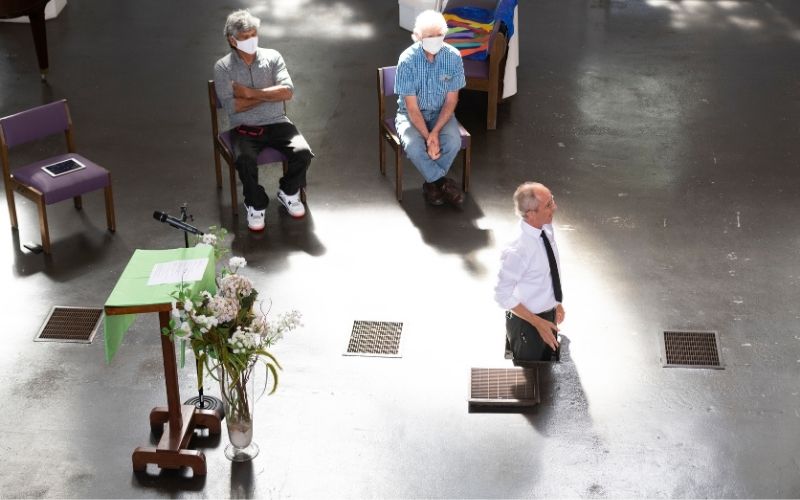
Pastor Shawn Anglim standing in an air vent that flooded during Hurricane Katrina.
Pastor Shawn concluded his remarks with a powerful statement of solidarity: “[Latinx immigrants] came to this city and rebuilt our houses of worship, your homes, your children’s schools, and building after building. This city is as much theirs as ours. Today we New Orleaneans remember our immigrant sisters and brothers as fellow New Orleaneans. You made us better. From the bottom of our hearts we say, muchas gracias!”
Long-time leaders in the local movement for immigrant justice, Leticia Casildo and her husband, Mario Mendoza, co-direct the immigrant aide organization, Familias Unidas en Accion. Leticia’s remarks at the prayer service about their love for a city and country that often do not love them back touched me deeply. Leticia said she came to New Orleans to work just two months after Katrina, when the city was completely destroyed with no place to eat or to rest, but that it “did not matter to us, we did everything we could. We came to work and we gave it our all… And you know what? We fell in love with the city and we stayed.” She stayed even though at times people have made her community feel like “intruders,” even though after completing rebuilding projects some have “flushed us like we did not matter.” But she knows that “we are people with honor and that we are people with dignity with much more to give.”
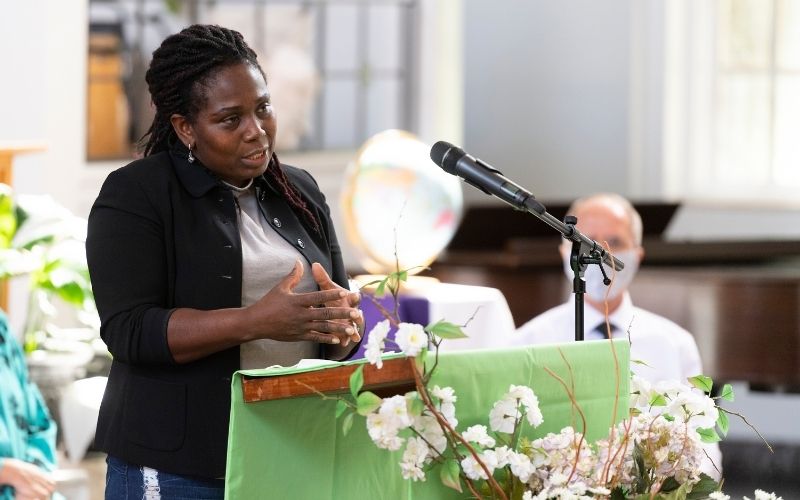
Leticia Casildo and her husband, Mario Mendoza, co-direct the immigrant aide organization, Familias Unidas en Accion
Despite suffering such injustices, Leticia offered a moving prayer for love and unity, “Katrina united us and taught us that we need to treat each other as equals and support each other… Just because someone does not have papers does not take away their humanity. Just because someone was not born in this country it does not mean they do not love this country. My message to this city, state, and nation is to love each other as human beings…Let’s try to build a better world to live in.”
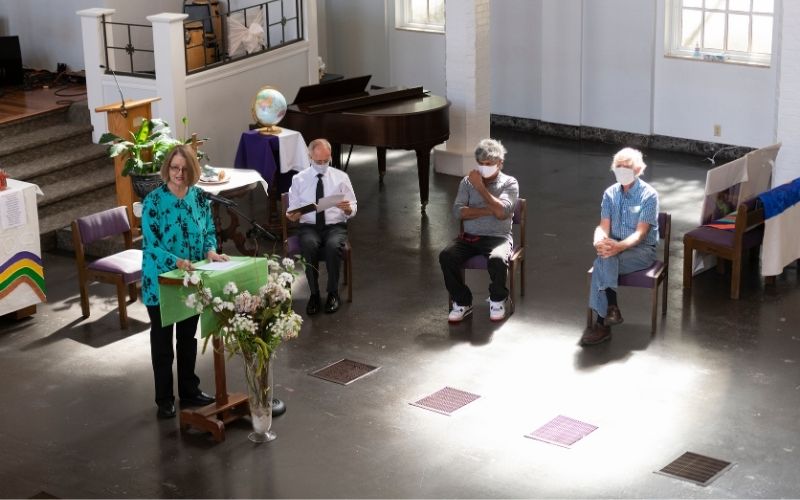
Sue Weishar, the author, speaks at the prayer service.
In my remarks, I noted that as our thoughts and prayers go out to our fellow Louisianans now facing the daunting task of rebuilding after Hurricane Laura, residents of western Louisiana can count on the labor of immigrant workers, many undocumented, to dig homes and businesses out of the muck and rebuild neighborhoods, like they have done after every weather disaster that has hit our region in the past 30 years. Turning to the immigrant leaders present I shared, “Our city has been so blessed by the gifts immigrant workers and their families have brought to us over the past 15 years–love of family, hard work, and an unwavering faith in the goodness of God. You have enriched our faith communities and reinvigorated neighborhoods, even though too often it is like you are invisible to us until another disaster strikes.”
St. Ignatius often wrote about the virtue of gratitude. For Ignatius, gratitude means the spontaneous response to the experience of the giftedness of reality. Gratitude opens the heart in love and generosity, and is key to living a virtuous life. Ignatius warned, however, that maintaining a sense of gratitude is difficult because we can easily take things for granted.
With the passage of time and so many other crises to address, too many New Orleaneans have forgotten or taken for granted the immense contributions immigrants made to rebuilding our city. This is why the August 28 prayer service was needed—to remind us of the many ways immigrants have gifted our community.
Leaving the prayer service, I experienced intense feelings of humility and gratitude. I was humbled to be a witness to the powerful testimonies of suffering and hope shared by our brave and committed immigrant speakers and the profound messages of love and appreciation provided by our faith leaders. I was also filled with a renewed sense of gratitude for the critical role immigrants have played in the rebuilding New Orleans. And just as Ignatius taught, it was a heart opening experience.
Sue Weishar, Ph.D., has been a policy and research fellow at the Jesuit Social Research Institute (JSRI) at Loyola University New Orleans since 2010. At JSRI, Sue has worked to build bridges between immigrants and faith communities through dialogs and teach-ins which center the personal testimonies of undocumented immigrants and the Church’s teachings on migration. Her research has focused on human rights violations in private prisons and immigrant detention centers, the impact of harsh immigration policies on migrants’ lives, and how faith communities can welcome immigrants and advocate for just and humane immigration policies.

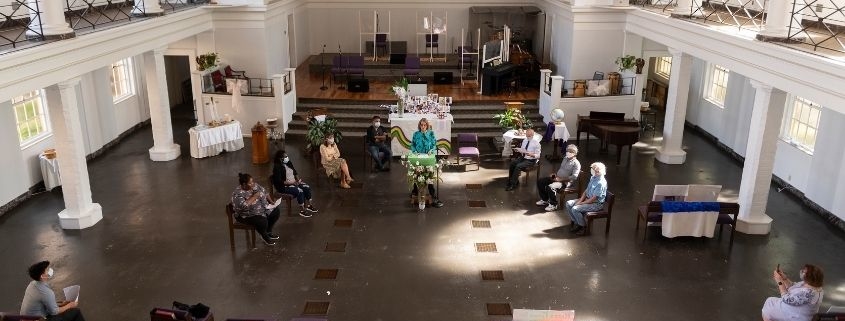
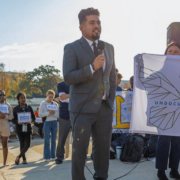
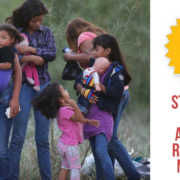
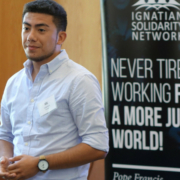
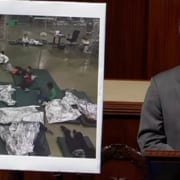

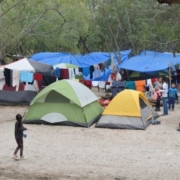

We are all descendants of some form of immigration some forced some freewill, it is those that respect and contribute to the land they live in just like during those dark days when disasters strikes and people stepped up.
Love thy brothers & sisters from lands far and wide if you become thy neighbor I will open my arms and treat you how you treat me,hopefully as a friend not a enemy and together we will cast out the evil that may try to drive a wedge between us.
Do not judge a person or a race for the sins of one man or one woman as it will be like walking into a infinite rose bush garden where each step you take you will tread on a thorn, each thorn represents a innocent person you judged just because of there race or another poor reason.
Respect the culture and laws of the land that accepted you and in return the same respect will be given back.
Hosts and immigrants are privileged to be walking on God’s Holy Ground and living in God’s time.
Only whites have privilege including white immigrants, remember that’s what people are saying and want to teach , I’m just a black man that is told everyday by my own race, justice fighters, media and white people ( apparently that speak for me ) that I can’t have privilege because of my race.
Immigrants like those that helped in Katrina should be talked about more and helped more, not me I have 2 feet if I wish to walk, I have 2 hands to shape my future and a mouth that if needed I can speak up….my race is destroying itself maybe soon it will be that will be the immigrant in another land.
People have forgotten the immigrants who rebuilt the city around us. It is sad how short our memories are. We who remember need to say “out loud” the truth of who was part of our dirtiest work tin rebuilding.